初三Unit 15导学案1
- 格式:doc
- 大小:18.00 KB
- 文档页数:1
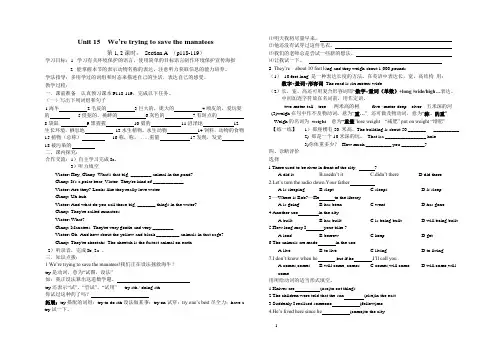
Unit 15 We’re trying to save the manatees第1, 2课时:Section A (p118-119)学习目标:1. 学习有关环境保护的语言,使用简单的目标语言制作环境保护宣传海报2. 能掌握本节的表示动物名称的表达,注意听力获取信息的能力培养。
学法指导:多用学过的词组和时态来描述自己的生活,表达自己的感受。
教学过程:一.课前准备认真预习课本P118-119,完成以下任务。
(一)写出下列词组和句子1.海牛2.毛皮的3.巨大的,庞大的4.顽皮的,爱玩耍的5.侵犯的,挑衅的6.灰色的7.有斑点的8.袋鼠9.黑猩猩10.猎豹11.沼泽地12.生长环境,栖息地13.水生植物,水生动物14.饲料,动物的食物15.植物(总称)16.称,称,……重量17.发现,发觉18.被污染的二、课内探究:合作交流:1)自主学习完成Ia。
3)听力填空Victor: Hey, Ginny. What's that big, ________ animal in the pond?Ginny: It's a polar bear, Victor. They're kind of ____________.Victor: Are they? Looks like they really love water.Ginny: Uh-huh.Victor: And what do you call those big, _______ things in the water?Ginny: They're called manatees.Victor: What?Ginny: Manatees. They're very gentle and very ________.Victor: Oh. And how about the yellow and black _________ animals in that cage?Ginny: They're cheetahs. The cheetah is the fastest animal on earth.2)听录音,完成Ib, 2a 。
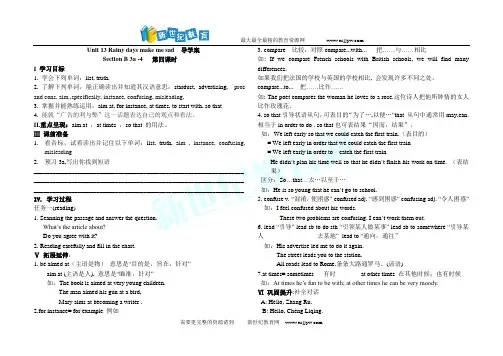
最大最全最精的教育资源网 需要更完整的资源请到 新世纪教育网 - Unit 13 Rainy days make me sad 导学案Section B 3a -4 第四课时I 学习目标1. 学会下列单词:list, truth,2. 了解下列单词,能正确读出并知道其汉语意思:stardust, advertising, pros and cons, aim ,specifically, instance, confusing, misleading,3. 掌握并能熟练运用:aim at, for instance, at times, to start with, so that4. 能就“广告的利与弊”这一话题表达自己的观点和看法。
II.重点呈现:aim at ,at times ,so that 的用法。
Ⅲ 课前准备1. 看音标,试着读出并记住以下单词:list, truth, aim , instance, confusing,misleading2. 预习3a,写出你找到短语_________________________________________________________________________________________________________________________________________________________________________________________________________ IV. 学习过程 任务一(reading)1. Scanning the passage and answer the question. What’s the article about? Do you agree with it?2. Reading carefully and fill in the chart. Ⅴ 拓展延伸:1. be aimed at (主语是物) 意思是“目的是,旨在,针对”aim at (主语是人), 意思是“瞄准,针对” 如:The book is aimed at very young children.The man aimed his gun at a bird, Mary aims at becoming a writer .2.for instance= for example 例如3. compare 比较,对照compare...with... 把……与……相比如: If we compare French schools with British schools, we will find many differences.如果我们把法国的学校与英国的学校相比, 会发现许多不同之处。
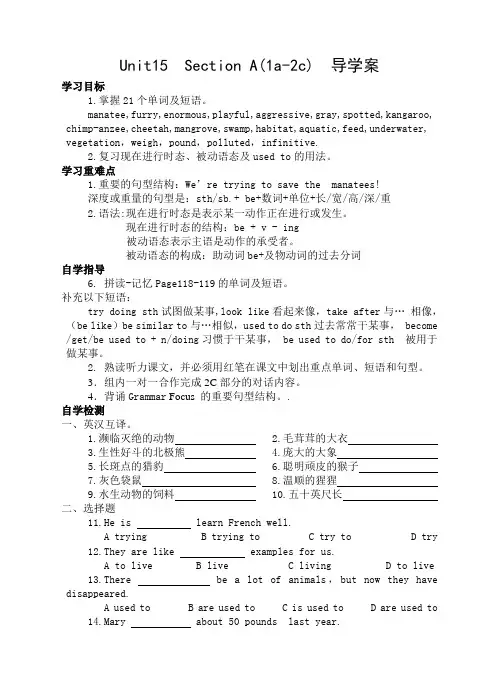
Unit15 Section A(1a-2c) 导学案学习目标1.掌握21个单词及短语。
manatee,furry,enormous,playful,aggressive,gray,spotted,kangaroo, chimp-anzee,cheetah,mangrove,swamp,habitat,aquatic,feed,underwater, vegetation,weigh,pound,polluted,infinitive.2.复习现在进行时态、被动语态及used to的用法。
学习重难点1.重要的句型结构:We’re trying to save the manatees!深度或重量的句型是:sth/sb.+ be+数词+单位+长/宽/高/深/重2.语法:现在进行时态是表示某一动作正在进行或发生。
现在进行时态的结构:be + v - ing被动语态表示主语是动作的承受者。
被动语态的构成:助动词be+及物动词的过去分词自学指导6.拼读-记忆Page118-119的单词及短语。
补充以下短语:try doing sth试图做某事,look like看起来像,take after与…相像,(be like)be similar to与…相似,used to do sth过去常常干某事, become /get/be used to + n/doing习惯于干某事, be used to do/for sth 被用于做某事。
2. 熟读听力课文,并必须用红笔在课文中划出重点单词、短语和句型。
3.组内一对一合作完成2C部分的对话内容。
4.背诵Grammar Focus 的重要句型结构。
.自学检测一、英汉互译。
1.濒临灭绝的动物2.毛茸茸的大衣3.生性好斗的北极熊4.庞大的大象5.长斑点的猎豹6.聪明顽皮的猴子7.灰色袋鼠 8.温顺的猩猩9.水生动物的饲料 10.五十英尺长二、选择题11.He is learn French well.A tryingB trying toC try toD try12.They are like examples for us.A to liveB liveC livingD to live13.There be a lot of animals,but now they have disappeared.A used toB are used toC is used toD are used to14.Mary about 50 pounds last year.A weighB weighedC was weighedD weighs 合作探究探究一:英语中表示长、高、宽及深的结构(用适当的例名加以展示)学以致用句型转换1.How heavy are you ?( 改为同义句)How much you ?2.This book provided much information for us.(同上)This book provided much information .3.Han mei’ mother makes her practice playing the violin.(改为被动语态)Han mei practice playing the violin by her mother.4.They play basketball twice a day.(对划线部分提问)do they play basketball?5.The manatee is about 8 feet long and it weighs about 800 pounds.(同上)is the manatee?6.I like this animal because it is strong and intelligent.(对划线部分提问)you like the animal?7.He can hardly say a ward.( 改为反义疑问句)He can hardly say a ward, ?8.Lucy was gived some works to do by his mother.(改为主动语态)Lucy’s mother Lucy some works . 课堂小结课后反思Unit15 Section A(3a-4) 导学案学习目标1.掌握8个单词及短语。
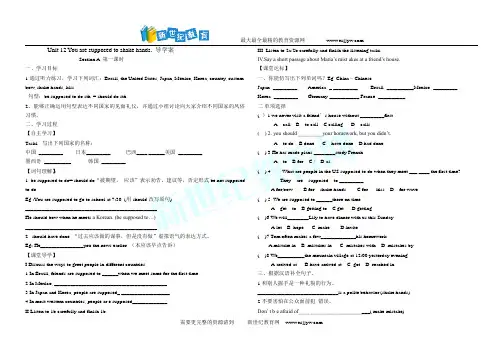
最大最全最精的教育资源网 需要更完整的资源请到 新世纪教育网 - Unit 12 You are supposed to shake hands. 导学案Section A 第一课时一、学习目标1.通过听力练习,学习下列词汇:Brazil, the United States, Japan, Mexico, Korea, country, custom bow, shake hands, kiss句型:be supposed to do sth. = should do sth.2、能够正确运用句型表达不同国家的见面礼仪,并通过小组讨论向大家介绍不同国家的风俗习惯。
二、学习过程 【自主学习】Task1. 写出下列国家的名称: 中国 _________ 日本_________巴西____ ______美国 _________墨西哥 __________韩国 _________【词句理解】:1. be supposed to do= should do “被期望, 应该”表示劝告,建议等,否定形式be not supposed to do.Eg :You are supposed to go to school at 7:30. (用should 改写原句) _________________________________________________. He should bow when he meets a Korean. (be supposed to…) _________________________________________________.2.. should have done “过去应该做的谋事,但是没有做”虚拟语气的表达方式。
Eg: He________________you the news earlier .(本应该早点告诉) 【课堂导学】I.Discuss the ways to greet people in different countries.1.In Brazil, friends are supposed to ______when we meet some for the first time.2.In Mexico, __________________________________________.3.In Japan and Korea, people are supposed_ __________________4.In most western countries, people ar e supposed_____________. II.Listen to 1b carefully and finish 1b.III. Listen to 2a/2b carefully and finish the listening tasks. IV .Say a short passage about Maria’s mist akes at a friend’s house. 【课堂达标】一、你能仿写出下列单词吗?Eg. China – Chinese Japan- _________ America- _ _________Brazil- __________Mexico- _________Korea- _________ Germany-___________ France- __________二.单项选择( )1.we never visit a friend ’s house without _________first . A call B to call C calling D calls ( ) 2. you should _________your homework, but you didn’t. A to do B done C have done D had done ( ) 3.He has made plans ________study French . A to B for C / D as( ) 4.----- What are people in the US supposed to do when they meet ___ ____ the first time?-----They are supposed to _________A for,bowB for shake handsC for kissD for wave ( ) 5. We are supposed to ______there on time . A get to B getting to C get D getting ( )6.We will________Lily to have dinner with us this Sunday. A.let B. hope C. make D.invite( )7.Tom often makes a few_____________his homework.A.mistake inB. mistakes inC. mistakes withD. mistakes by ( )8.We__________the mountain village at 12:00 yesterday evening. A.arrived at B.have arrived at C. got D. reached in 三、根据汉语补全句子。
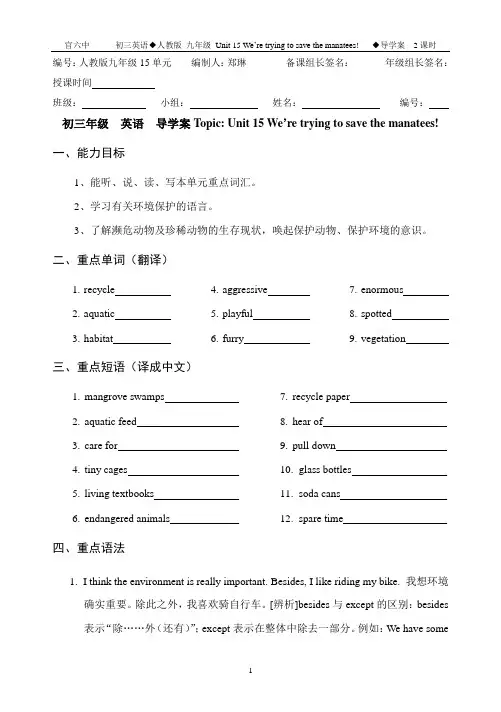
编号:人教版九年级15单元编制人:郑琳备课组长签名:年级组长签名:授课时间班级:小组:姓名:编号:初三年级英语导学案Topic: Unit 15 We’re trying to save the manatees!一、能力目标1、能听、说、读、写本单元重点词汇。
2、学习有关环境保护的语言。
3、了解濒危动物及珍稀动物的生存现状,唤起保护动物、保护环境的意识。
二、重点单词(翻译)1.recycle2.aquatic3.habitat4.aggressive5.playful6.furry7.enormous8.spotted9.vegetation三、重点短语(译成中文)1.mangrove swamps2.aquatic feed3.care for4.tiny cages5.living textbooks6.endangered animals7.recycle paper8.hear of9.pull down10.glass bottles11.soda cans12.spare time四、重点语法1.I think the environment is really important. Besides, I like riding my bike. 我想环境确实重要。
除此之外,我喜欢骑自行车。
[辨析]besides与except的区别:besides 表示“除……外(还有)”;except表示在整体中除去一部分。
例如:We have someother books besides those. 除了那些书,我们还有其他的。
All except Tom were ill.除了汤姆,其余都病了。
2.You have probably never heard of Amy Winterbourne, but she is a most unusualwoman. 你也许从来没有听说过艾米·温特伯恩,但她是一位非常与众不同的女人。
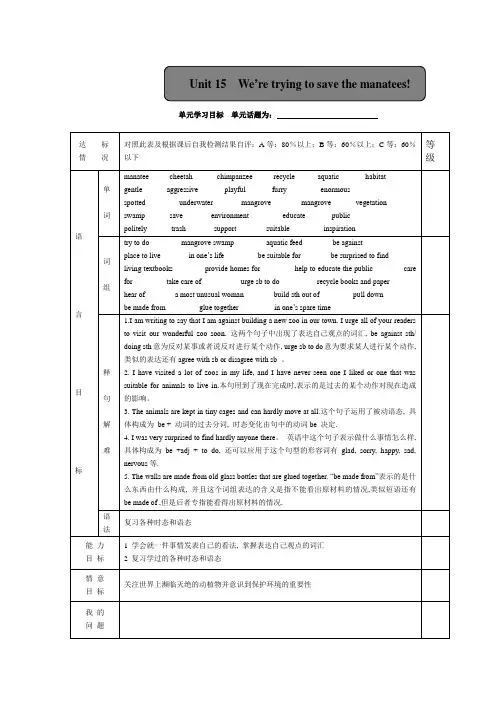
Period 1(page 118-119)【课前自主学习】Part I. 根据英语释义写单词。
1.The place where something lives. ________.2.There aren’ t very many of them. ________3.Underwater plants an vegetation. _________4. A place where trees grow in water. _________Part II. 完成听力练习,回答下列问题。
1. What kind of animal is it?2. How many of them are there?3. Where is the habitat of the animal?4. Why are this animal endangered?.【课内合作探究】Task:1.完成听力练习后,分小组讨论,介绍海马的情况。
Period 2(page 120)【课前自主学习】Part I.仔细阅读教材P120、3a然后填空。
1.我写信来是想说我反对在我们镇上新建一个动物园。
________________________________________2.动物园对动物来说住起来不是好地方。
_______________________________________________3 我一生当中见过很多的动物园,但是我从未见过一个适宜动物居住的。
________________________________________________4. 动物园对于小孩子来说就像生动的教科书。
______________________________________________Part II.读3b部分,然后回答下列问题。
1.Does Animal Friend agree to build a new zoo?2.What can zoos provide for animals?3.What does he urge people to do?【课内合作探究】Task:小组活动,4个人一组,采访其他3位同学并完成下列表格,讨论并总结Period 3(page 121)【课前自主学习】Part I.预习下列广告语,按照中文提示写出单词。
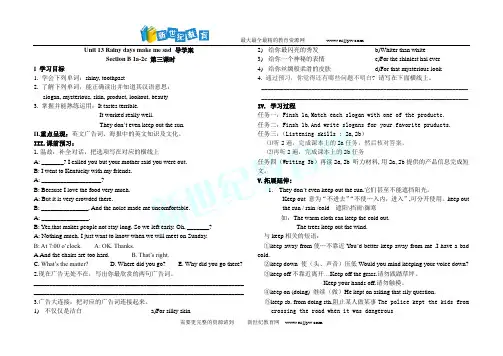
最大最全最精的教育资源网 需要更完整的资源请到 新世纪教育网 - Unit 13 Rainy days make me sad 导学案 Section B 1a-2c 第三课时I 学习目标 1. 学会下列单词:shiny, toothpast 2. 了解下列单词,能正确读出并知道其汉语意思: slogan, mysterious, skin, product, lookout, beauty 3. 掌握并能熟练运用:It tastes terrible. It worked really well. They don ’t even keep out the sun. II.重点呈现:英文广告词、海报中的英文知识及文化。
III.课前预习: 1.温故:补全对话,把选项写在对应的横线上 A: _______? I called you but your mother said you were out. B: I went to Kentucky with my friends. A: ___________________? B: Because I love the food very much. A: But it is very crowded there. B: _______________. And the noise made me uncomfortable. A: _______________. B: Yes,that makes people not stay long. So we left early. Oh, _______? A: Nothing much. I just want to know when we will meet on Sunday. B: At 7:00 o’clock. A: OK. Thanks. A.And the chairs are too hard. B. That’s right. C. What’s the matter? D. Where did you go? E. Why did you go there? 2.现在广告无处不在,写出你最欣赏的两句广告词。
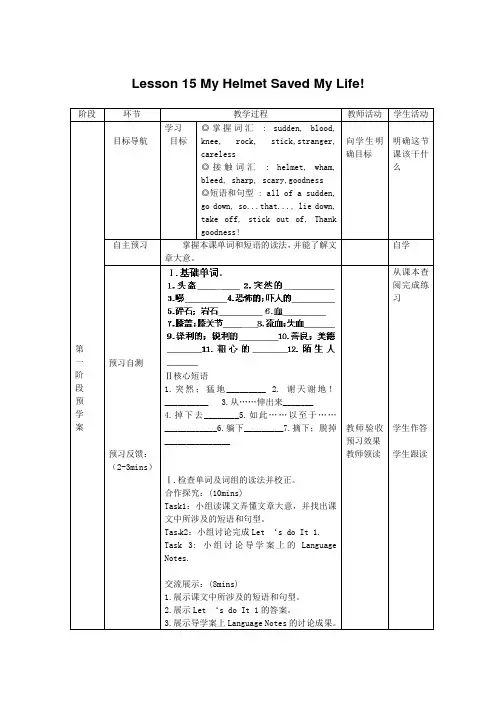
Lesson 15 My Helmet Saved My Life!阶段环节教学过程教师活动学生活动第一阶段预学案目标导航学习目标◎掌握词汇: sudden, blood,knee, rock, stick,stranger,careless◎接触词汇: helmet, wham,bleed, sharp, scary,goodness◎短语和句型 : all of a sudden,go down, so...that..., lie down,take off, stick out of, Thankgoodness!向学生明确目标明确这节课该干什么自主预习掌握本课单词和短语的读法,并能了解文章大意。
自学预习自测预习反馈:(2-3mins)Ⅱ核心短语1.突然;猛地_________2. 谢天谢地!__________ 3.从……伸出来_______4.掉下去________5.如此……以至于……____________6.躺下_________7.摘下;脱掉_______________Ⅰ.检查单词及词组的读法并校正。
合作探究:(10mins)Task1:小组读课文弄懂文章大意,并找出课文中所涉及的短语和句型。
Tas k2:小组讨论完成Let ‘s do It 1.Task 3: 小组讨论导学案上的LanguageNotes.交流展示:(8mins)1.展示课文中所涉及的短语和句型。
2.展示Let ‘s do It 1的答案。
3.展示导学案上Language Notes的讨论成果。
教师验收预习效果教师领读从课本查阅完成练习学生作答学生跟读第二阶段教学案合作探究:交流展示:精讲点拨:(27mins )精讲点拨:(4mins)Language Notes:1. A ll of a sudden, WHAM! 突然,砰!(1) all of a sudden 同 suddenly,都是“突然地;出乎预料地;冷不防”的意思。
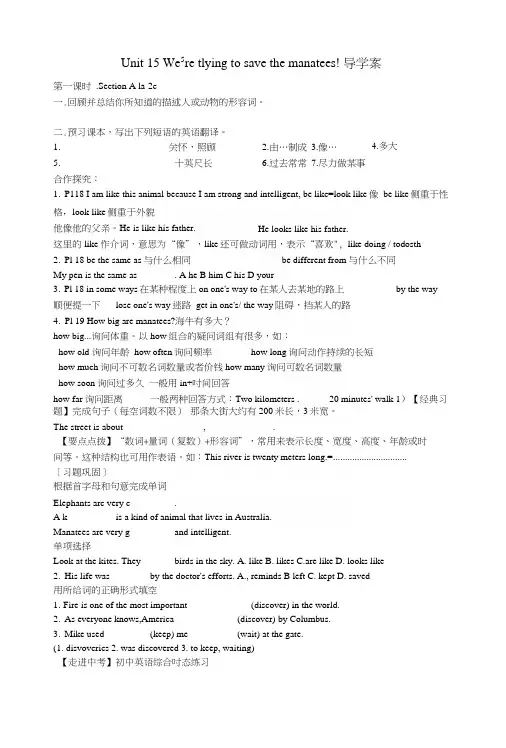
Unit 15 We 5re tlying to save the manatees! 导学案第一课时 .Section A la-2c一.回顾并总结你所知道的描述人或动物的形容词。
二.预习课本,写出下列短语的英语翻译。
1. 关怀,照顾 2.由…制成 3.像… 5.十英尺长6.过去常常7.尽力做某事合作探究:1. P118 I am like this animal because I am strong and intelligent, be likc=look like 像 be like 侧重于性格,look like 侧重于外貌他像他的父亲。
He is like his father. 这里的like 作介词,意思为“像”,like 还可做动词用,表示“喜欢", like doing / todosth2. Pl 18 be the same as 与什么相同be different from 与什么不同My pen is the same as _______ . A he B him C his D your3. Pl 18 in some ways 在某种程度上on one's way to 在某人去某地的路上 by the way顺便提一下lose one's way 迷路 get in one's/ the way 阻碍,挡某人的路4. Pl 19 How big are manatees?海牛有多大?how big...询问体重。
以how 组合的疑问词组有很多,如: how old 询问年龄 how often 询问频率 how long 询问动作持续的长短how much 询问不可数名词数量或者价钱how many 询问可数名词数量how soon 询问过多久 一般用in+吋间回答how far 询问距离 一般两种回答方式:Two kilometers . 20 minutes' walk 1)【经典习题】完成句子(每空词数不限) 那条大街大约有200米长,3米宽。
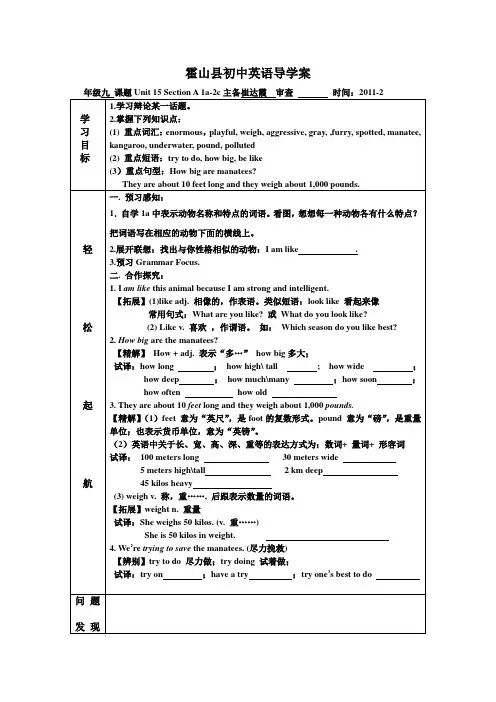
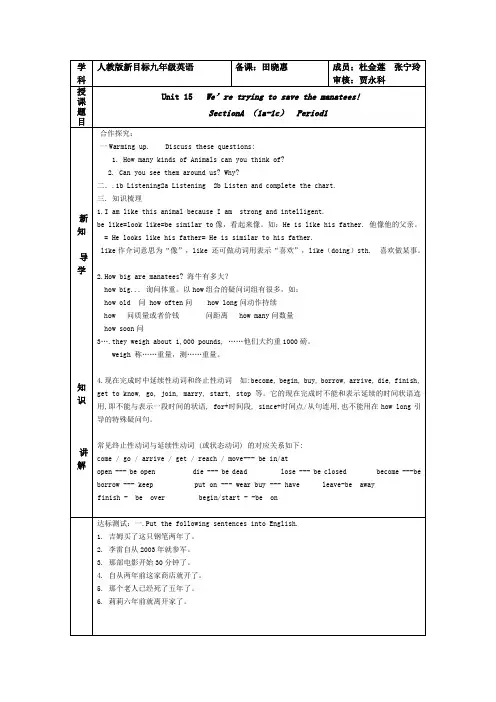
九年级英语导学案(Unit 15)一、重点词汇称__________________磅______________极小的_________________ 表达_______________拉_________________行星_________________ 社会______________空闲的______________模型_________________ 生意_____________ 塑料_________________确实地______________ 骄傲的________________________ 旗帜________________________二、重点短语1. be endangered 濒临灭绝endangered animals 濒临灭绝的动物2. as you can see 正如你所见3. ten feet long 十英尺长eight meters high 八米高two meters tall 两米高twenty meters wide 二十米宽4. be against doing sth. 反对做某事be for doing sth. 赞成做某事Are you for or against? 你赞成还是反对?【即学即用】W e are peace and war.A. against; againstB. for; forC. for; againstD. against; for5. be suitable for sb. 对某人适合6. be surprised to do sth. 惊奇做某事be surprised at… 吃惊于……to one’s surprise 使某人吃惊的是7. living textbook 活生生的教材8. provide sth. for sb. 为某人提供某物【即学即用】Last month, they much money the poor people.A. provide; forB. provide; withC. provided; forD. provided; with9. care for 关怀take good care of sb. 照顾好某人look after sb. well care for sb. well10. urge sb. to do sth. 强烈要求某人做某事【即学即用】The teacher urges his students on time when they do everything.A. areB. beingC. to beD. be11. weigh 100 pounds 重100磅lose one’s weight 减肥12. average person 普通人13. take one’s own bag 带某人自己的包14. live close to 住得离……很近close the door 关门The door is closed. 门是关着的be closed to sb. 与某人亲密come very close 来得紧迫15. hear of 听说16. be built out of sth. 由……制造17. be an inspiration to sb. 对某人是一个灵感18. in one’s spare/free time 在某人空闲时间三、重点知识讲解1. ...and help to educate the public about caring for them. ……并且帮助教育公众关爱它们。
自主合作探究《英语》导学案九年级下册班级:姓名:济南市长清区五峰中学编号:№1 班级小组姓名小组评价教师评价Unit 11 Section A 1a—2c学习目标1.掌握8个单词( restroom, shampoo, drugstore, cafe, escalator, magic)2.有礼貌的询问信息;掌握宾语从句的用法( 语序, 时态)重难点1.对地点的委婉提问以及回答Could you please tell me how to get to the post office ?Could you tell me where the post office is ?Could you tell me which is the way to the post office ?Could you tell me if there is a post office near here ?2.主从复合句的地点,时间、原因、条件、让步状语从句学法指导一、自学1.单词(拼读—组内听写过关)(尽量在5分钟内完成)shampoo n 香波 shampoo v 用香波洗头escalator n 电动扶梯,手扶梯,滚梯 elevator n 电梯, 升降机(美) liftlike magic 非常快速的, 非常有效的2.通读Section A 1a—2c,红笔画出短语,地点状语,熟读并背诵Grammar Focus中的三到五个句子,标注自己不能理解的地方以备质疑3.完成1a 并熟记短语,学科组长检查4.组内对话练习(1c--2 c)(10分钟)5.独立完成导学案并上交二、正课1.课前检测(单词或背诵检查)(3)2.解读本节课学习目标(10)3.听力与对话展示(1c, 2c)(12)4.导学案讨论释疑(10)5.学以致用(7)6.整理与背诵(3)自学检测翻译写列短语1.打电话2.节约钱3.在书店和杂货铺之间4.向右转5.go past the bank6.next to7.exchange money 8.writing paper9.得到一些关于我们学校的信息10.把英语书带给Tom二、单项选择11.There some water and oranges on the floorA beB isC areD was考点:there be 结构中be动词与最近的主语保持一致12.Go the park and it is on your leftA passB passedC pastD pasted考点13.I want to know when ?A the girl was bornB the girl is bornC was the girl bornD is the gril born 考点14.Lily is standing Mary Jack, she is the tallest her cousinsA among ,and , betweenB between, and , betweenC among, and ,amongD between, and, among考点:15.The street runs Baihu ParkA overB throughC acrossD past考点★三完成下列句子16.乘电梯去12楼17.你知道他是否有一些重要的信息要告诉我吗?18.昨天,老师说地球是围绕着太阳转的四、合作探究pass, past, passed, cross, across, through(从词义,词性,相关短语入手展开讨论,并用例句加以解释说明)五、整理背诵我学会了:我的疑问:编号:№2 班级小组姓名小组评价教师评价Unit 11 Section A3a—4学习目标1.掌握3个单词 1个短语(fresh, block, oak, hang out)2.能正确运用宾语从句以及不定式重难点1.主从复合句的运用2.短语(hang out, too much, much too)动词的运用( decide, prefer, spend)等的运用3.动词不定式学法指导一、自学1.单词fresh adj 清新的、没有经历的 be fresh out of 刚卖完…;刚供应完…freshman 一年级新生 freshwater 淡水block n 街区;大块(石头,木头);a block of ice 一大块冰v 阻挡 block something out隔断,挡住(某物,尤指光线或声音)(喻)从头脑(或记忆)中抹去(不快之事),忘却2.通读Section A 3a 勾画出短语和词汇、标注不明白之处以备质疑;大声朗读并完成文后表格hang out 闲逛 Hang around 悠闲地消磨时间;闲荡hang together 团结一致;紧密团结 Hang in the air悬而未决prefer to do sth prefer sth/doing to sth/doingdecide to do sth decide on sthspend (time, money) in doing/on sth3.浏览3b, 组内完成讨论4.独立完成导学案并上交二、正课1.课前单词检测(5)2.自由辩论(3B 每组同层同学一名谈论下列问题,其余同学认真听并做好记录,找错,臵疑)(10)3.导学案讨论释疑与课文背诵(3a)(15)4.学以致用(10、activity 4)5.背诵(5)自学检测:一、在课文中找出下列短语并翻译1.how about2.kind of small3.hang out4.a lot of5.free concerts6.go past the bank7.too much money 8.go to the mall二、句子分析与运用P88. …There’s always something happening看,有些蓝色的鸟儿在空中飞翔P88… It’s also just fun to watch people结构:图书馆是一个看书的好地方P88… I also like to look at books in the bookstore思考:also, too, either, as well用法区别look at books可以用read books替换吗?P88…I prefer being outside熊猫喜欢蜂蜜胜过竹子Prefer to :Like better than :P88 …when I go into stores I always spend too much money大多数7年级5班的学生在周末花了大量的时间去帮助无家可归的人简单句:复合句:There is snow on the ground and it still snows heavily (too much, much too)合作探究1.There be(常见考点,以例句形式加以解释说明总结)2.I think it is useful to learn English well否定句:反意疑问句:She thinks it is useful to learn English well否定句:反意疑问句:小结:编号:№3 班级小组姓名小组评价教师评价Unit 11 Section B1.掌握6个单词,1个短语(uncrowded,slide,clown, staff,organized,market,dress up)2.能根据具体语言环境,灵活运用语言进行有礼貌的询问和获取信息重难点:宾语从句短语学法指导一、自学1.单词(拼读—听写过关)(尽量在6分钟内完成)Slide n 滑道 v滑动; 滑行let something slide 放任某事,任其自然dress down 责备;指责 dress up 盛装:穿正式的或精选的服装dress up as sb/dress sb up in sth 打扮成 dress oneselfdressed to kill 打扮迷人的 dress something up修饰;添枝加叶地描述market 市集, 市场 be in the market for . 想买2.通读Section B 了解大意,尽力完成1a (交学科组长检查)大声朗读3A至少三遍,标注短语和自己看不明白的地方3.独立完成导学案上交二、正课1.单词检测(5)2.听力与课文背诵(3a)(12)3.导学案讨论释疑与展示(18)4.学以致用(Section B activity 3b, 6 )5.背诵(4)自学检测1.Could you tell me / there is a good museum in Sunville?在横线上填上适当的单词,并作用法比较2.在课文中找出该句,并分析句子They can find it at the Farmer’s Market where the food is both delicious and cheapfind sth + adj 发现怎么样, find sb doing 发现某人正在做某事结构:find + it + adj + to do sth★知识延伸: 请分别用下列短语造句both…and either…or neither…nor3.The Fine arts museum is both beautiful and interesting.(同义句)The Fine arts museum is________beautiful__________interesting. 选择最佳答案,找出考点()4.Maybe Lily and her parents are______at the mallA bothB allC everyD none()5.Many visitors enjoy__a few days walking the jungleA to spend acrossB spending throughC spending;thoughD to spend cross()6.He______himself as Father Christmas.A puts onB wearsC hasD dresses()7.I don’t know______Mr Wang lived two years ago.A whereB whenC whyD which( )8.The weather here is very nice.It’s_____too cold_____too hot.A both;andB either orC neither norD between;and()9.Either you or I _____wrong. A are B be C were D am 相关短语put on ----- take off 强调穿戴的动作 in , wear 强调状态either…or , 或者或者 neither…nor 既不也不,谓语动词都是就进原则kind of, a little 有点, all/different kinds of 各种各样enjoy doing sth, have fun doing sth, have a good/great time 过得愉快合作探究Teengers will want to visit the word’s largest water slides and eat at Uncle Bob’s关于名词所有格知识整理:编号:№4 班级小组姓名小组评价教师评价Unit 11 Self check--Reading学习目标1.掌握7个单词1个短语(lend,park, direct, orde,wonder,lead,trouble,hand in)2.复习巩固本单元所学从句,短语重难点:短语 In order to, lend to, have trouble doing学法指导一、自学1.单词(拼读—听写)lend sth to sb borrow sth from sblend an ear 倾听,洗耳恭听 lend one’s name to 以某人的名义支持order ! 安静 in order for/that 为了 on order 已订购但还未到货in order to do sth 为了目的lead in the front 身先士卒,带头干have trouble/difficult doing sth2.完成,交学科组长检查3.通读Reading 部分,勾画出含新单词的句子以及短语和自己不明白的地方;大声朗读课文完成文后3a, 3b,交学科组长检查完成情况;再组内核对答案4.独立完成导学案并上交二、正课1.单词短语检测(5)2.minitalk ( Reading -1b) 集体交流(5)3.导学案讨论释疑(15)4.课文理解与背诵(10)(以小组分段的形式背诵)5.学以致用(7)6.整理(3)自学检测一、翻译下列短语1.正好挨着2.既安全又方便3.填空4.ask for5.sound rude6.much more polite7.depend on 8.as important as 9.pay for10.the same as 11.extra words 12.lead in ★二、在课文中找出该句并分析We change the way we speak when talking with different people三、单项选择11.It sounds to use “ Could you…?” than “ Can you …?”A politelyB politeC more politelyD more polite12.Knowing how to ask for information important for usA politely isB is politelyC polite isD is polite13.I wonder how itA they didB did theyC did they doD they did do14.Gina is saving money buy her grandma a Christmas presentA so thatB soC in order toD in order that15.The litter girl picked up a pair of shoes and to a policemanA hander it inB hand in itC hand it onD hand on it四、举一反三P92 …so knowing how to ask foe information politely is important16.知道如何保持健康对每个人都是很重要的P93 …I wonder if you can help me or…★17.不知道您能否帮我照看以下我的小狗当我出去的时候?(look after )P93…however, in order not to offend people,…..★18.为了不冒犯别人,学会当一个好的听众是很有必要的五、同意句转换19.Could you please lend me a bike ?20.May I a bike you ?21.Learning from others is very importantvery important from others学以致用Tony独自一人去成都,下飞机以后发现自己的包都遗留在飞机上了,钱和护照都在包里面,他能怎么做呢?请写一段对话小结整理编号:№5 班级小组姓名小组评价教师评价Unit 12 Section A 1a—2c学习目标1.掌握4个单词,3个短语( shake, kiss, bow; custom, shake hands, know about, be supposed to do)2.用be supposed to do sth 表劝告、建议等重难点:be supposed to do 的用法重点句型:You are supposed to kissYou are not supposed to shake hands学法指导一、自学1.单词(拼读-听写)shake v 摇动、震动 n 摇动;奶昔shake down 从…敲诈金钱 shake off 从…敲诈金钱shake the dust from one’s feet 愤怒地离开;轻蔑地离开quake vi 颤抖,哆嗦(+at/with/for)地震; n颤抖,哆嗦know about 了解有关…的情况2.通读Section A 1a—Grammar Focus勾画短语,(包括听力材料)熟悉be supposed to do组内完成对话练习1c, 2c,背诵Grammar Focus中句子3.独立完成导学案并上交二、正课1.单词检测(3)2.课题解读,学习目标解读(7)3.听力(5)4.导学案讨论释疑(15)5.对话展示(10)( activity 1c, 2c)6.整理背诵(5)自学检测一、在课文中找出并翻译下列短语1、第一次某人2、到达3、应该做某事4、吃错食物5、用错误的方式问候某人6、犯错7、被邀请8、握手二、过关斩将( ) 9.--- Will you come to the dinner party? --- I will not come until Jenny __________.A will be invitedB can be invitedC invitedD is invited( ) 10.John _______ Beijing the day before yesterday.A arrived atB arrivedC reached toD arrived in( ) 11.I find ________ difficult to remember everything, though I’m still young.A thatB thisC itD what( )12.He _____ at the last party. He felt sorry for it.A makes some mistakesB make a mistakeC made few mistakesD made many mistakes( )13.---Is it easy for people from different countries to greet each other?--- I don’t think so. Because different countries have different _______.A clothesB foodC wayD customs( )14.Don’t be late next time. You _________ earlier.A are supposed to comeB are supposed comeC are supposed to comingD suppose coming( )15.Wang Lan bowed the audience when she finished her gameA inB atC forD to( )16. the custom sending birthday cards started in the 19th century A about B of C on D with★三、牛刀小试17.昨天他应该完成所有的作业18.Bill Gates应该是相当富裕的( quite rich)19.你们不应该迟到20.我碰巧知道有关她的情况,可我不认识她 ( know about, know)合作探究1 be supposed to do , ought to do , should 请尝试用例句解释说明单词辨析:mistake, wrong, fault, erro, weakness, shortcoming小结我学会了:我的疑问:编号:№6 班级小组姓名小组评价教师评价Unit 12 Section A 3a—4学习目标1.掌握4个单词,2个短语,1个句型(relaxed, land, towards, greet; drop by, after all,)(Can you tell me the things I’m supposed to do?)2.复习巩固be supposed to do 的用法重难点1.动名词,动词短语的运用2.具体语言环境中be supposed to do 的运用学法指导一、自学1.单词(拼读—组内听写过关)relaxed relaxing (--ed, --ing)land n/v field平原,田野一块土地,田地;牧场 floor /groundin the land of the living 在人世, 还活着(来自《圣经》)Good land! /My land ! [美口]天哪!好家伙!真糟糕!land( fall) on one’s feet 走运,成功back lands 穷乡僻壤, 未开发的土地 bad-lands 荒原2.通读activity 3a 了解大意,勾画短语,标注自己不明白的地方3.组内对话练习activity 3B 独立完成activity4中表格,组长检查完成情况4.独立完成导学案并上交二、正课\1.单词检测(3)2.课文理解与背诵(10)3.对话活动展示3B,4(12)4.导学案讨论释疑(16)5.整理背诵(4)自学检测一、在课文中找出下列短语1.顺便拜访2.问候老师3.及时4.按时5.有时6.一起去某地7.对时间相当宽松 8.迟到10分钟9.制定计划 10.四处走走 11.毕竟12.尽可能二、用所给词的适当形式填空13. ( walk ) a few minutes every day is good for our health14. Don’t visit your friends without ( call ) first in westerncountries15. They had pretty rules at that timeand all the people were ( relax )16. Little Jimmy always plans ( do ) something interesting17. Everyone should work as ( hard ) as he can18.I just want to know if there is someone invites you ( play ) basketball19.Switzerland is the land of ( watch )20.All of us are ( suppose) to hand in the test paper on time三、单项选择21.Try your best, Linda, It’s only difficult for you , you can do it wellA a bit ofB a bitC a lot ofD a lot22.Is there in today’s newspaper?A something importantB anything importantC important somethingD important anything23.The twins sat in the sun, a story book togetherA to readB readingC to watchD watching24.Liu Jia usually goes to school without breakfast, he is really paleA to eatB eatsC eatingD eats25.Don’t be angry with him, , he is only fiveA in allB after allC of allD at all四、同义句改写26.Fish can live with water ( without )27. My sister helped me as much as she couldMy sister helped me as much as28.I’d like to visit my uncle’s bookstore on my way to schoolI to my uncle’s bookstore on my way to school合作探究:1 、I suppose everyone will volunteer否定句:反意疑问句:关于否定前移:在think / believe / suppose / guess / imagine / expect等动词后跟宾语从句否定式时,应转移到主句上去,完成反意疑问句时,应与从句主、谓保持一致。
Unit15Section A一、Teacher’s word: There is only one person who can define success in your life and that is you.在你的人生中只有一个人可以定义成功,那个人就是你。
二、学习目标1:The use of important words and phrases ;Review “used to” “ present simple” “ passive voice ”“present perfect”2:How to describe animals;Debate an issue with your own words.3:It’s our duty to save endangered animals.三、教学重难点:识记单词并能熟练运用。
能运用所学知识进行自主表达。
四、学习过程1. 预习导学及自测(1)自主学习P118-120上的生词。
(2)尝试性题目:根据首字母及汉语提示完成单词。
1.The little dog is p .Many visitors like it.2.He is 1.87 meters tall but he only w 55kg.3.The river has been p with waste water from local factories.4.Different kinds of birds are kept in large c in the zoo.5.The book is s ( 适合的)for children.6.In the world, different animals have different (生长环境)。
7.What would you do if you won a million p ?2. 情景导入:We and the animals all live in the world. What kind of animals do you like?Why? Can you describe them with the words we have just learned?3. 自主探究(1)1a、Write these words in the boxes below.(2)听录音,完成2a,2b.(3 ) 尝试翻译下列短语P118-119濒临灭绝的动物水下植物长着红树的沼泽地一条斑点狗100英镑的食物一条被污染的河流重1000英镑10英尺长(4 )自主阅读3a,3b.判断正(T)误(F)1.“Disgusted” is aga inst building a new zoo in the town.( )2. He thinks zoos are good places for animals to live in.( )3. Last week he visited a zoo and thought the animals in the cages are happy enough.( )4.There were a lot of people in the zoo when “Animal Frend” visited the zoo yesterday.( )5.He thinks zoos are important places for endangered animals and they can educatethe public about caring for animals.( )4.合作交流(1)Group work:说出你和某种动物的相似点,让你的同学猜猜是哪种动物。
最大最全最精的教育资源网 需要更完整的资源请到 新世纪教育网 - Unit1 How do you study for a test ?Period One Class Name【Learning objectives 】学习目标1 通过卡片学习下列词汇:flashcard,aloud,pronunciation,skill,voice 能读会默。
2 小组合作练习目标语言How do you study for a test? I study by doing … 【Important leaning points 】学习重点运用by doing 谈论学习方式 一、自主学习1、预习熟记本课单词flashcard,aloud,pronunciation, skill,voice, improve, vocabulary, list 2, 完成下列短语和朋友一起学习 制作抽认卡 看课本 制作词汇表 听磁带 向老师寻求帮助 3、理解下列对话,并利用上面词组练习: A :How do you study for a test? B :I study by working with a group. A :How does Bob study for a test? B :I study by marking flashcards. A :Do you learn by.........? B :Yes,I do. /No, I don't. 4 、听录音,完成1 b 二、合作探究根据下面的句子,总结by 的用法和含义: 1、I have to be in bed by 10 o'clock. 2、There is a tree by the river. 3、I go to work by bus.4、The boy is sent to the hospital by a kind man.5、You can learn English by working with friend 三.能力提升1、理解2a 、2b 中的句子,找出下列短语:看英文光碟 和朋友连交际大声读 练习发音 小组学习 说的技能 做.........太难 2、听录音,完成2a 、2b 四、当堂检测 (一)补全单词:1、It's a good way to read a2、The boy often l up the words in the dictionary.3、Do you have an i about weekend?4、K a diary helps to write English every day.5、The girl often learn by a the teacher for help.6、What about reading about to practise p ? (二) 句型转换1、I study art by listening to music.2 、Mary plays computer games by asking friends for help. (一般疑问句) 3、I have learned a lot by watching videos. (一般疑问句)4、What about (practice) conversation with friends ?5、You should read (loud) to learn English.6、Tom wants (improve) my physics. 五 、作业布置1、总结 too… to … 用法最大最全最精的教育资源网 需要更完整的资源请到 新世纪教育网 - 2、预习P4 3a How do you learn best ? 【课后反思】Unit1 How do you study for a test ?Lesson: Period Two Class Name 【Learning objectives 】学习目标1. 小组提问,掌握下列单词,specific, memorize, grammar, differently, frustrate, frusrating, quickly, add, not at all, excited, end up.能读会拼写。
2006 年浙江地区九年级英语Unit15 教案教学目标1. 掌握且能运用有关询问某人身体状况的日常用语,能述说健康状况以及谈论病情和给出建议或要求的日常交际用语。
2. 掌握本单元的词汇和习惯用语,特别是短语make up one' s mind, as if, at least 等的用法。
3. 进一步学习动词不定式,学习用it 来充当形式主语的用法,有时还用it 来充当形式宾语,而真正的主语或宾语后置句末。
如:I found it difficult to learn English well.4. 认真学习” The man who loved dogs ”和” Cody saves the baby ”,体会人与动物自然、友好相处的和谐。
Lesson 57Properties: Recorder, Overhead ProjectorTeaching Objectives:1. Understand the dialogue.2. Learn some useful structures and phrases.3. Learn the grammar: the Infinitive.Lan guage focus: like being a …,play with, a lot of funTeaching Procedures:I. Showing the teaching aimsII. RevisionRevise the names of animals that could be kept as pets: dog, cat, snake, parrot, rabbit, fish, etc. Ask Does anyone have a pet? What kinds of animals would you like to have as pets?III. Leading inAsk: What do you want to be when you grow up? Let the students discuss the question. Then give the second question: What do you want to be, a doctor for humans or a doctor for animals? Why?IV. PresentationLook at the picture in Lesson 57. The boy is sitting on the sofa. His fatheris talking with a dog in his hand. What did they say? Play the tape for the students to listen, check the answers with the students. Then read the dialogue and answer the questions of Exercise 1 in the workbook in pairs. Go through the dialogue and explain some language points.Play the tape for the students to listen and repeat, ask the students to practise. Then let them act out the dialogue in pairs.VI. Free practiceDo an example with one student. Then let the class make up their own dialogues in pairs. Get them to act out their dialogues. Ask the students to discuss the questions. Ask:Do you think it's more important to help people than animals? Why?What kinds of jobs do you know?What would you like to be in the future?What are your parents' job?Do your parents like their job? Why or why not?VI. PresentationAsk the students to find the Infinitive sentences. 1. To be a doctor for animals is very rewarding.2. To help animals is helping people. Ask the students to pay attention to the Infinitive. Give them more examples to understand better. Then go through Part3. Choose the possible answer. Let the students master this form:It is adj . + to do something / To do something is + adj .VII. WorkbookDo Exercise 3 in class. Let the students translate the sentences into Chinese.VII. SummaryExercises in classHave a dictation.1. Do you like being a doctor for animals?2. To be a doctor for animals is very rewarding.3. To help animals is helping people.4. A pet can help a person feel less lonely.5. To play with a pet is a lot of fun.6. To complain too often isn ' t a good thing.7. To work hard brings success.Open the books check the answers by themselves and correct their spelling mistakes.IX. Homework1. Recite the dialogue.2. Pre - read in Lesson 58.Lesson 58Properties: Recorder, Overhead Projector.Teaching Objectives:1. Understand the text.2. Learn some useful words and expressions.Teaching Procedures:I. Showily the teaching aimsII. RevisionCheck the homework. Then revise the dialogue in Lesson 57. Ask the students to act out the dialogue. Study the new words in this lesson.III. Leading inAsk the students this question: There is a famous animal doctor in England. He wrote many books about animals, what ' s his name? Let the students read the textand answer the question.IV. ReadingAsk the students to listen to the tape and answer the question: Which animaldid Herriot like best? Then go through the questions of Exercise 1 in the workbook. Make sure they can understand them. Ask them to read the story more carefully and discuss the answers to Exercise I in the workbook in pains. Check the answers with the whole class. Deal with any grammatical or lexical problems that arise.1. make up one's mind to do somethingHe has made up his mind to study English well.2. go on with something: Let ' s go on with our lesson.3. regard . . . asHe regards his teacher as his mother.V. Reeling aloudPlay the tape for the students to listen and repeat. Use any methods that youthink suitable: repetition by the whole class, groups, pairs or individual students. Then give out some key words and phrases. Let the students retell the story.VI. WorkbookDo Exercise 2. The answers are: for, grow up, into, that, made up, mind, treat, Before, treated, heal, treating, At, at, on, regardedFor Exercise 3. Let the students do it by themselves. Choose the best answer,then read the sentences together. Pay attention to the grammar. Let the students make up more sentences.VII. SummaryExercises in classFill in the blanks.1. He made up his mind ______ (study) English well.2. ______ (treat) large animals is hard work.3. Ifs hard work _____ (treat) the dogs.4. Please go on _____ (read) the text.5. He grew up with a pet dog ______ (name) Don.6. The dogs ______ never _______ (treat) when they became sick.7. Everyday as he went to the farmers _____ (heal) sick animals.Answers: to study, Treating, to treat, reading, named, were treated, to healVIII. Homework1. learn the phrases, make sentences with them.2. Retell the story.Lesson 59Properties: Recorder, Overhead ProjectorTeaching Objectives:1. Understand the dialogues2. Learn the grammarLanguage focus: the InfinitiveTeaching Procedures:I. Showing the teaching aimsII. RevisionCheck homework, ask two or three students to retell the story about Lesson 58.III. Leading inGive the students a topic, let them make up a dialogue. For example:Why did you become a doctor for animals?What do you like best about your job?Is it easy to heal sick animals?IV. PresentationTell the st udents that we' ll learn a dialogue about a child ' s doctor. First, ask the students to use the following dialogue in Exercise I to help them. Then work in pairs.V. Free PracticeSuppose your friend is a doctor for. . . . Interview her or him about her or his job. Use the dialogue in Lesson 59 to help you, make up a new dialogue, work in pairs, then do Exercise 1.VI. PracticePart 2. Look at the picture. Say something about it. For example:To be a doctor is very interesting.To be a sick man is very painful.To do as the doctor tells you is important.Change these sentences beginning with: It 's + adj. + to do something. Go through Exercise 2, ask the students to finish changing these sentences.VII. WorkbookDo Exercise 2. The answers are:1. It ' s necessary to prepare a place for the dog.2. It ' s good for the dog to take a walk every day 。
最大最全最精的教育资源网 需要更完整的资源请到 新世纪教育网 - Unit 14 Have you packed yet ? 导学案 Section A (1a-2c) 第一课时 一、学习目标:知识目标:1. 掌握词汇:bathing suit, towel, refrigerator, garage 2. 掌握句型: Have you watered the plants yet ? No, I haven’t . Have you packed the camera yet ? Yes. I’ve already put it in my suitcase . H ave you fed the cat ? No. I haven’t fed her yet 能力目标:掌握语法:谈论近来发生的事件及对未来的计划。
【自主学习案】 预期目标:1、掌握 P110 ——P111的词汇 2、复习掌握现在完成时的基本知识 预习导航: (一)现在完成时态的基本句子结构: 1、肯定句:________________________ 2、否定句:______________________- 3、一般疑问句:_____________________________ (二)过去分词的构成 规则变化: 规则 例词 1、_________________________________ _______________ 2、_________________________________ ________________ 3、_________________________________ _______________ 4、_________________________________ _______________ 不规则变化:(自己能默写多少就写多少) 1、清除;打扫干净 _______________ 2、 泳装 __________________ 3、沙滩巾 ____________ 4、过一会儿___________ 5、 关闭 ____________ 【群学学案】 预期目标:通过复习进一步掌握现在完成时相关知识。
Unit 15 We are trying to save the manatees
Period I New words
【学习过程】
I Listen, read and memorize new words.
II. Learn to how to use the words:
1. weigh (measure how heavy sth is) 做及物动词,意为“称…重量”He ___________
himself on the bathroom scales everyday. He _________ the stone in his hand. 做不及物动词,意为“称分量”She weighs 60 kilos. 名词为_______________翻译:The average weight of a baby at birth is over seven pounds. _____________________.
2. tiny adj. 意为very small, 比较级_______, 最高级____________,反义词________and __________
3. urge v. strongly advise sb. to do sth. urge sb. to do sth. / urge that
翻译:我极力劝说他重新考虑我的决定。
______________________.
老师劝说学生仔细做作业。
____________________________
4. expression 不可数名词:表达,表示,She gave ___________ to her sadness.
可数名词:措辞:”Shut up” is not a polite expression.
5. pull v. (use force on sth. in order to move it towards oneself) 拉,拖,拔
做不及物动词:You push and I’ll pull. ________________.
及物动词:词组:pull sth.
6. society n. 社团,社会例如He was a member of a drama society. _________________________________.他对社会有害。
_____________________________.
7. inspiration n. 灵感(不可数),鼓舞人心的人或事物(可数)
没有灵感我无法写作。
_________________________.
This woman is an inspiration to all of us.
9. recycle v. 回收利用:纸张可以回收利用。
________________ 回收利用对帮助保护我
们的环境很重要。
_____________________ adj. recycled paper
单词构成法学习,字首re=again, back
a.Most of the house you see were ____________(重建) after the big fire.
b.I seem to _________(回想起) that he was with us at that time.
c.I have to _________(背诵) the whole poem.
d.I have received your letter of resignation but I want you to __________(重新考虑)your
decision.
e.Scientists are trying to __________(重新创造)these conditions.
f.At the end of the year the company __________(重组)。
10. pollute v. (to make air, water, soil dangerously dirty and not suitable for people to use) 这条小河被脏水污染了。
_________________
n. pollution the pollution of …。